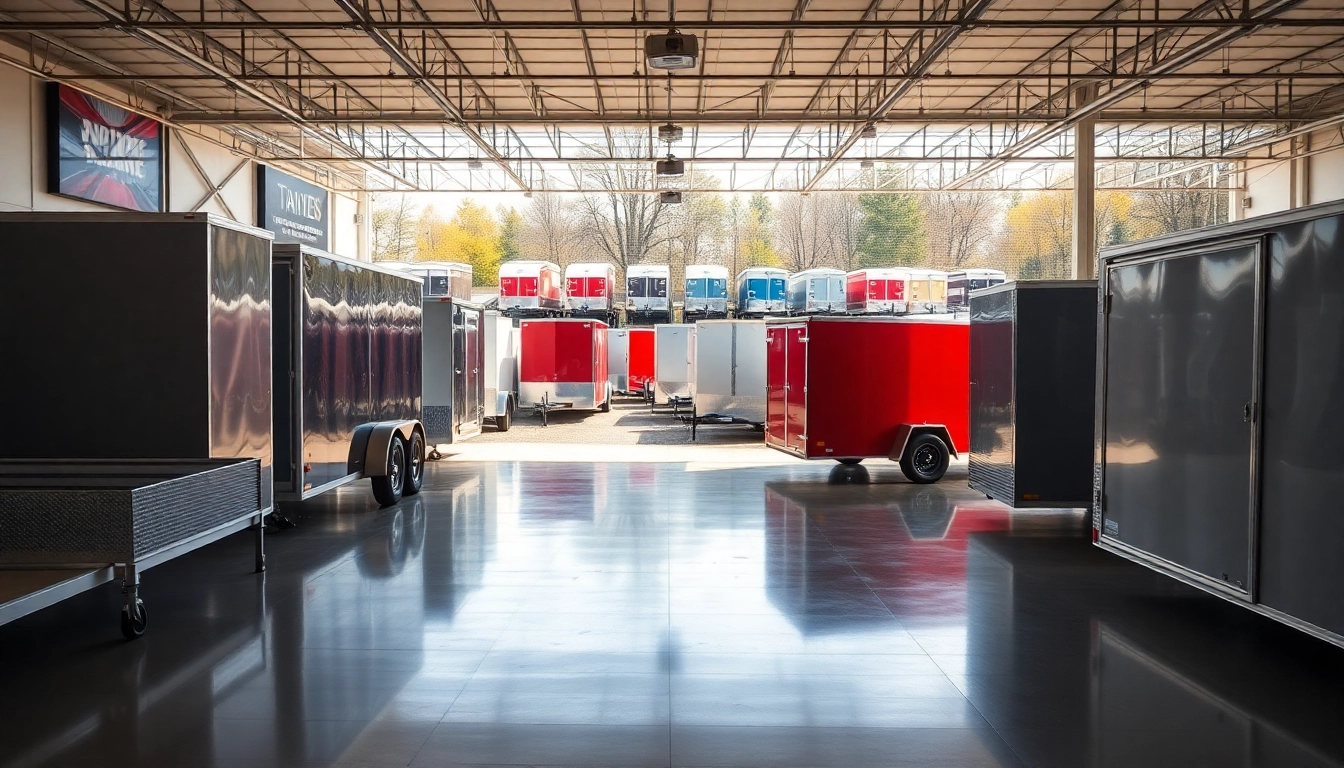
The Best Trailers for Sale in Massachusetts
When searching for trailers for sale in Massachusetts, the variety available can be overwhelming. From utility and cargo trailers to specialty types like dump and equipment trailers, the options are abundant. Knowing what to look for not only aids in making an informed purchase but also ensures you find a trailer that meets your specific needs. This guide explores the various types of trailers available, key features to consider, popular brands, and essential tips for making the right choice.
Types of Trailers Available
Massachusetts offers a diverse selection of trailers catering to different requirements and purposes. Below are some of the most common types of trailers you will find:
- Cargo Trailers: Ideal for transporting goods, cargo trailers come in various sizes and can be found in both enclosed and open formats. They are built with durability in mind and can handle various payloads.
- Utility Trailers: These versatile trailers are best known for their simple design and practical use in moving lightweight vehicles or equipment. They typically have open sides and are excellent for yard work or construction supplies.
- Dump Trailers: Designed for carrying heavy loads, dump trailers have a hydraulic lift that allows for easy unloading, making them popular for landscaping, construction debris, and waste management.
- Enclosed Trailers: These offer added protection for items being transported. They are commonly used by contractors and service providers who need to secure their tools or materials from the elements.
- Car Hauler Trailers: Specifically designed for transporting vehicles, these trailers come equipped with features for easy loading and secure transportation.
- Horse Trailers: Built to accommodate horses, these trailers prioritize comfort and safety for equestrian activities.
Key Features to Consider
When choosing a trailer, there are several vital features to keep in mind:
- Weight Capacity: Assessing the weight limit of the trailer is crucial as it ensures that it can handle your intended load. Be mindful of both the Maximum Gross Weight Rating (MGWR) and the payload capacity.
- Construction Material: The durability of a trailer largely depends on its materials. Trailers made of steel offer higher strength and longevity, while aluminum trailers are lighter and resistant to rust.
- Brakes: Understanding the braking system is essential, especially for heavier loads. Some trailers come equipped with electric brakes, while others may have surge brakes. Select one based on your needs and vehicle compatibility.
- Size and Dimensions: Choose a trailer size that can accommodate your transport needs while remaining manageable for your vehicle to tow.
- Tie-Down Points: Ensuring that your cargo remains secure is essential, and having sufficient tie-down points can make securing loads much easier.
- Additional Features: Look for features like ramps for easier loading, lighting for safety during transport, and storage compartments that may add to the utility value of your trailer.
Popular Brands to Explore
Quality varies among manufacturers, making brand reputation a significant factor. Here are some popular trailer brands available in Massachusetts:
- Haulmark: Known for their durable construction and reliable performance, Haulmark trailers are popular for both enclosed and open models.
- Thunder Trailers: Offering a variety of customizable options, Thunder Trailers are recognized for their high quality and innovative designs.
- Big Tex Trailers: Big Tex has a wide range of trailers, particularly well-regarded for utility and car haulers.
- Iron Bull Trailers: This brand focuses on heavy-duty construction, making them an excellent choice for those who need to haul exceptionally large loads.
- Aluma Trailers: Specializing in aluminum trailers, Aluma is known for lightweight, rust-resistant designs perfect for transporting equipment and vehicles.
How to Choose the Right Trailer for Your Needs
Identifying Your Requirements
Choosing the right trailer starts with understanding your specific needs. Are you transporting landscaping equipment, moving household items, or hauling vehicles? The purpose strongly influences the style and specifications that best suit you. Here’s how to pinpoint your requirements:
- Assess Your Cargo: Consider the dimensions, weight, and type of items you plan to transport. This will help narrow down options significantly.
- Frequency of Use: If you’ll be using the trailer regularly, investing in a higher-quality model may be worthwhile.
- Towing Vehicle: Make sure to take into account the towing capacity of your vehicle to determine compatibility with your trailer choice.
- Special Features: Depending on the cargo type, you may need additional features like removable sides, taller dimensions, or enhanced durability.
Understanding Weight and Capacity
Understanding the weight and capacity ratings of a trailer is paramount to ensure safety and efficiency in transport. Each trailer will have a specified weight limit, and exceeding this limit can lead to serious safety risks.
Key weight specifications include:
- Gross Vehicle Weight Rating (GVWR): The maximum allowable weight of the trailer and its cargo.
- Unloaded Vehicle Weight (UVW): The weight of the trailer without any cargo.
- Payload Capacity: The difference between the GVWR and the UVW, indicating how much weight can legally be added to the trailer.
Prioritize accurate calculations to achieve effective load management and avoid penalties or accidents while on the road.
Licensing and Registration Tips
Before hitting the road, ensure that your trailer is properly registered and that you comply with any licensing requirements specific to Massachusetts. Here’s what you need to consider:
- Title Requirements: When purchasing a trailer, make sure to obtain the title transfer. States have regulations governing ownership transfer that must be adhered to.
- License Plates: Most trailers will require a license plate. Verify Massachusetts regulations concerning trailer registration to ensure compliance.
- Insurance: While not mandatory for all trailers, securing insurance can provide peace of mind against potential accidents or damage.
- Safety Inspections: Certain trailers may require regular safety inspections. Check local requirements to ensure that your trailer meets safety standards on the road.
Pricing Factors for Trailers in Massachusetts
New vs. Used Trailers
The decision between purchasing a new or used trailer can significantly impact your budget. Here are some factors to evaluate:
- New Trailers: Generally come with warranties, higher quality, and the latest features but can be considerably more expensive. They are best suited for those who will use the trailer frequently and require reliability.
- Used Trailers: Offering a more budget-friendly option, used trailers can save you considerable money. However, it’s essential to check for wear and tear, rust, or any other signs of damage before making a purchase.
- Market Trends: Prices can fluctuate based on demand and supply. Keeping an eye on local trailer markets can help buyers identify the best time to purchase.
Hidden Costs to Consider
While purchasing a trailer, it’s critical to budget not just for the purchase price but for hidden costs that can quickly add up. Here are some common hidden costs:
- Tax and Registration Fees: These fees can vary widely but should be factored into your total purchase budget.
- Maintenance and Repairs: Depending on the trailer type and age, ongoing maintenance and unexpected repairs can add to the overall cost of ownership.
- Insurance Premiums: The type of trailer and its uses will determine the insurance cost, which can be a significant ongoing expense.
- Equipment for Towing: Don’t forget to account for additional items such as towing hitches, which can be necessary in order to effectively use a trailer.
Financing Options and Budgeting
Financing can ease the financial burden of purchasing a trailer. Many dealerships offer financing programs that include:
- Installment Plans: Spreading out the total price into manageable monthly payments can allow for better cash flow management.
- Trade-ins: Some dealerships may accept your old trailer as a part of the down payment for a new one, saving you upfront cash.
- Personal Loans: Many buyers may choose to secure a personal loan to purchase a trailer. Research interest rates and terms to find the best deal.
Before financing, ensure that you have a clear budget in mind, including all associated costs, to avoid straining your financial situation.
Where to Find Top Deals on Trailers
Local Dealerships to Check Out
Starting your search at local dealerships can provide several advantages, including immediate availability, reputation, and the ability to inspect the trailer in person. Here are a few notable dealerships in Massachusetts:
- Tri-State Truck ‘N Trailer: Located in Hatfield, they have established themselves as leading dealers in the area, offering a wide selection of trailers.
- The Trailer Depot: Known for their various types of trailers, they serve a broad clientele across Massachusetts.
- Drinkwater Trailer Sales: This dealership offers a comprehensive selection of utility and boat trailers, along with exceptional customer service.
Online Marketplaces and Classifieds
Online platforms can broaden your search for trailers significantly. Websites like Craigslist and Facebook Marketplace frequently list both new and used trailers. Tips for using online marketplaces include:
- Monitor Listings: Items can sell quickly, so frequent checks on listings can increase your chances of snagging a good deal.
- Evaluate Seller Reputation: Always research the seller, looking for reviews or ratings from previous buyers to ensure reliability.
- Inspect Before You Buy: If considering a used trailer, ask for a showing or inspection before finalizing any purchase.
Sourcing Custom Trailers
If you have specific needs that off-the-shelf models cannot fulfill, sourcing a custom trailer may be the way to go. Here are options for finding custom solutions:
- Local Builders: Many companies specialize in custom trailers in Massachusetts. Research local options with good reviews and established histories.
- Online Custom Trailer Suppliers: Websites allow customers to configure trailers according to their requirements. Typically, you can customize dimensions, features, and colors.
- Request Quotes: Always request quotes from multiple suppliers to ensure you receive a fair price for the customizations you desire.
Maintenance and Care for Your Trailer
Essential Maintenance Tips
Like any investment, trailers require care and maintenance to ensure longevity and performance. Key maintenance tips include:
- Regular Inspections: Periodic checks can help you catch potential issues early, reducing the risk of accidents on the road.
- Lubrication: Ensure proper lubrication of all moving parts, including the hitch and brakes, to maintain optimal function.
- Tire Care: Check tire pressure regularly and inspect for wear. Rotate your tires as needed for even wear.
- Cleaning: Regular cleaning protects the trailer’s exterior finish, prolonging its lifespan and maintaining its appearance.
Common Repairs and Troubleshooting
Even with proper maintenance, issues can arise. Understanding common problems can help you troubleshoot effectively:
- Electrical Failures: If lights fail to work, inspect connections and wiring. Replace any worn or corroded components.
- Brake Issues: If braking feels ineffective, inspect brake systems for wear or malfunction.
- Tire Problems: Common tire issues include flats and uneven wear; replace damaged tires immediately and align as necessary.
Maximizing Trailer Lifespan
To ensure that your trailer serves your needs for years to come, take steps to maximize its lifespan:
- Invest in Quality: Spending more upfront for a high-quality trailer can lead to fewer repairs and replacements in the long run.
- Avoid Overloading: Stick to the specified weight limits and always load items securely.
- Store Properly: When not in use, store your trailer in a dry, sheltered location to protect it from the elements.






